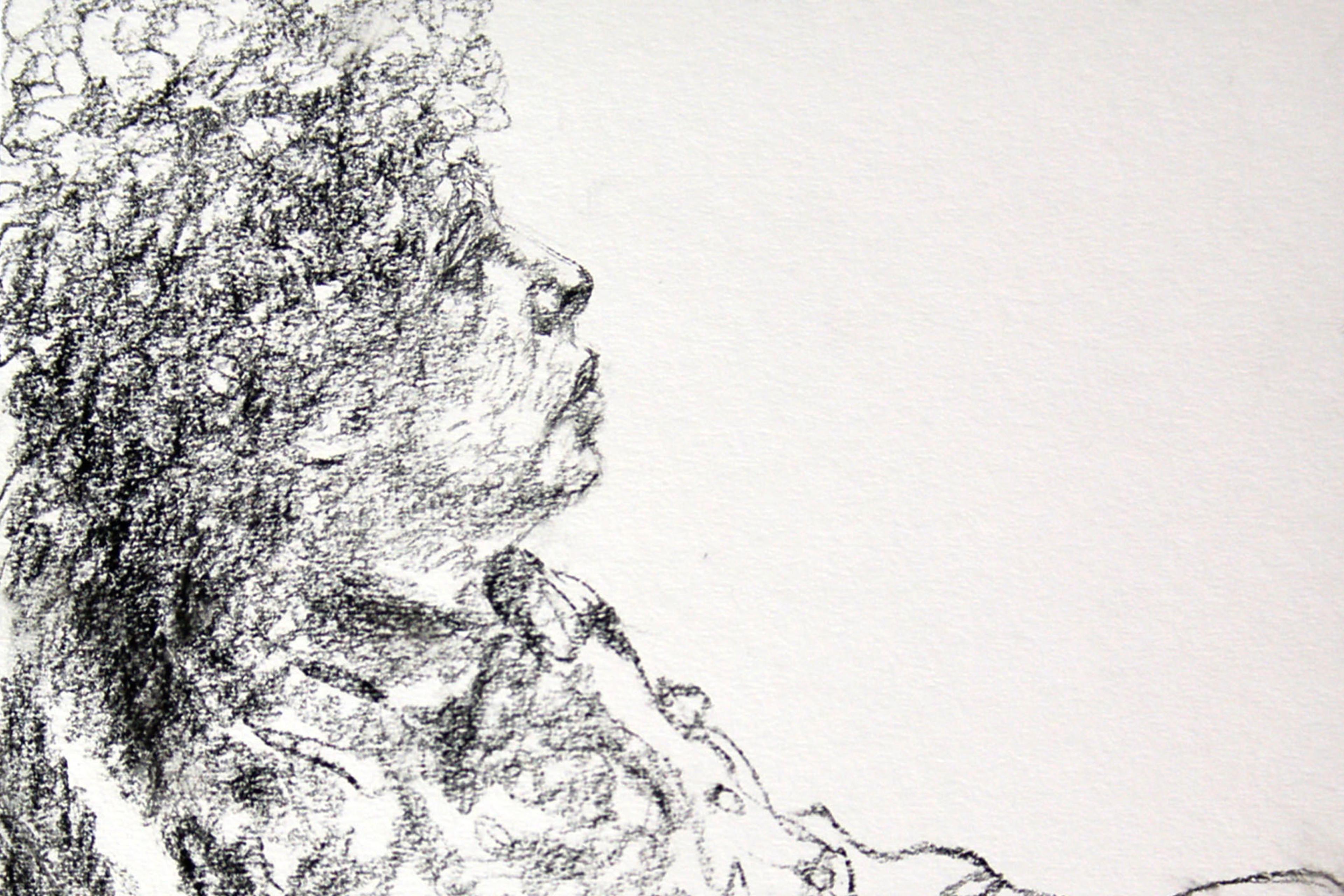In his book Trauma and Existence (2007), the American psychoanalyst Robert Stolorow suggested that when we meet someone whose experiential horizons don’t cross with our own, a gulf opens up that can feel difficult to bridge. If the other person’s views seem so alien that we can’t employ the template of our own experiences, then trying to understand might seem like too much hard work. The easiest response may be to turn away. But what if that person is someone you love, someone you care for? What if turning away is not an option?
This is the situation for people who are caring for a loved one with psychosis – an umbrella term that refers to the experience of perceiving things that other people don’t (‘hallucinating’, to use psychiatric terminology) and/or being convinced of things that seem implausible or untrue to others (ie, holding ‘delusional beliefs’). These experiences can be profoundly strange, frightening or confusing for both the person with psychosis and those around them, as revealed in the interviews my graduate student Ana Luderowski carried out a few years ago.
For example, consider Laurel (all our interviewees’ names have been changed to protect their privacy), a 40-something woman who spoke to us about her partner’s psychosis:
I’ve found it so disturbing … trying to understand psychosis when you can’t understand. It’s the one thing you can’t understand, because it’s madness … That’s the definition of madness … You can’t understand it. It’s not rational.
Indeed, many of our interviewees felt that neither they, nor their loved one, nor anyone else, including the clinicians, really knew what was going on. As another interviewee, Stephen, said about a clinician’s explanations of his relative’s psychosis: ‘I don’t know, they don’t know.’ Our interviewees didn’t see this as ignorance, or a deficiency in understanding to be overcome, but just as an absolute truth: psychosis is incomprehensible.
Yet, what was so striking was that, at the same time, many of our interviewees also felt that, in another sense, their relatives’ psychosis was completely understandable. In fact, we found that when people are confronted with a different worldview from someone they love, they are determined to try to understand. They labour to make sense of the other person’s perspective.
For example, take Kathleen, a woman in her 50s, who told us how her mother had been brought up in a strict Catholic culture and was ‘cast off’ by her family after becoming pregnant outside marriage. She had given birth to a mixed-race child in a racist and misogynistic environment. Kathleen felt that her mum was overwhelmed by these experiences of hostility and rejection, and she saw this as a perfectly rational explanation for why her mum experienced psychosis. Similarly, Arjun’s mother came to the UK from overseas and found the relocation hard, especially after her husband left her. Arjun says ‘she just found it quite difficult to cope, and she felt that … her world was being taken away from her.’ Again, this helped Arjun, a young man in his 20s, start to understand why his mother developed psychosis.
Many of our interviewees placed painful relationships at the heart of their loved one’s distress, describing experiences of alienation from family, society and culture. Emily, who had been caring for her sibling for 15 years, said: ‘there’s no proper place for them in society because society isn’t built for people like them’. Our interviewees’ intuitions chime with ongoing research by psychologists that’s shown psychosis can be a response to extreme interpersonal experiences, such as abuse, neglect, racism and exclusion.
There’s something fundamental about the need to understand the people we love that means we will go to considerable lengths to make meaning out of complex situations. Despite, or perhaps because, our interviewees found their loved one’s psychosis so hard to understand, they looked for ways to connect with them wherever possible – what we’ve called ‘mooring points’ of understanding. These are moments of familiarity, a shared reference, a shared history, or explanations that seem to help make sense of their loved one’s experiences. These mooring points helped our interviewees feel that they could stop their loved ones from ‘drifting’ away. For instance, when Adam, a 30-something man, spotted references to Doctor Who in his partner’s unusual beliefs, this gave him a point of connection that tied their shared culture and biography together: ‘It just got me somewhere … because I realised [the belief] comes from somewhere, it’s not completely mad.’ Other interviewees wondered about the role of nutrition, physical health issues and spiritual malaise. They offered help and care to their loved ones via homeopathic remedies, nourishing food, and their attempts to understand.
Mooring points were not easy to come by. Our interviewees scoured websites, read numerous books and attended support groups, so that they could piece together a patchwork of ideas to create and recreate an understanding that best accounted for their loved one’s experiences. But their hard work was rewarded through finding meaning and a feeling that they could maintain the loving bond of the relationship.
In a sense, by looking beyond the surface level of what their loved ones said or did, our interviewees had been practising hermeneutics – the art of interpretation – the ability to take something and look beyond it, within it, behind it, in order to understand it more fully. This is in noticeable contrast with dominant medical approaches to psychosis, which have dismissed the voices people hear, their visions, or sensing something that isn’t there, as all meaningless, while ignoring the content of any unusual beliefs, such as believing you are being persecuted or watched, and the related feelings of distrust.
Unfortunately, this view of psychosis as meaningless has filtered into popular consciousness through media representations of madness, where the person is seen to have lost touch with reality. Thankfully, the psychiatric survivor movement has done much to challenge this view through first-person testimonies that describe the meaning and significance of unusual perceptions and beliefs for people who experience them. Contemporary support groups such as the Hearing Voices movement argue that these experiences are meaningful, if we can see symptoms as symbolic representations of the person’s life experiences.
Our interviewees engaged in what’s called ‘hermeneutic labour’, which provided them opportunities to contact and ‘meet’ their loved ones in ways that felt shared. Understanding, being understood and sharing a meaningful life are central to feelings of belonging. In turn, belonging is fundamental to wellbeing and recovery from mental health problems.
Perhaps people try so hard to develop their own understandings because they find it hard to access sufficient information about their loved ones from mental health professionals. It’s also likely that the explanations favoured by psychiatry would not feel sufficient for someone trying to make sense of their loved one’s unique experiences. In 2014, the American community psychiatrist Carl Hammerschlag wrote that ‘the language of science cannot adequately explain the mystery that is an essential part of the human experience’. What is needed is understanding, not just explanation. Understanding prioritises the felt and relational aspects of experience, enabling people to make sense of each other, and to live alongside and love one another. Understanding requires what the Jewish philosopher Martin Buber described in the book I and Thou (1923) as a ‘meeting’ between people: a moment in which the other is seen as a whole person, not a collection of atomised qualities or symptoms. It is only this type of person-to-person meeting – deep understanding – that permits the rediscovery of what is shared between us.
As a psychotherapist, I wonder how our research into caring for someone experiencing psychosis could also relate to anyone who may be struggling to understand another’s worldview. We found that, despite the seeming incomprehensibility, people are able to build bridges, or at least create mooring points along the river, where they can meet others whose experiences are so different from their own. I wonder whether it is not only those we love so dearly who deserve that we make this effort.








